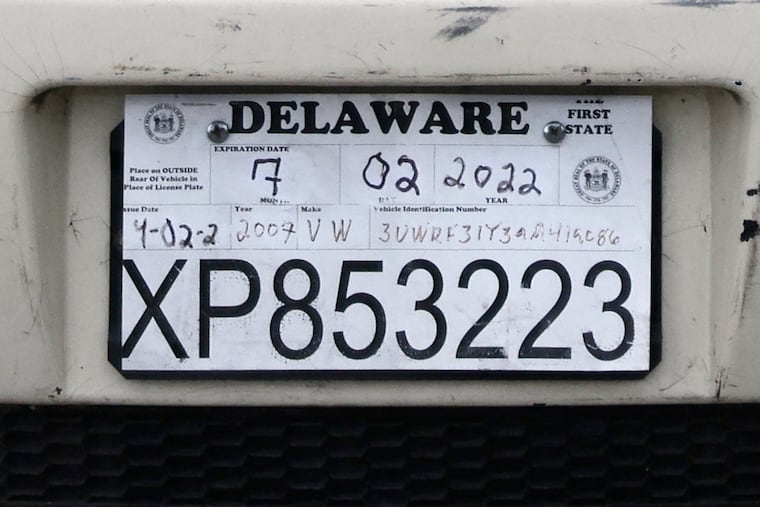City Council will hold hearings on the public safety threat presented by the rise of fake temporary license plates
In November, The Inquirer documented the rising trend of phony temporary plates in Philadelphia, which follows a national trend.

City Council will hold a public hearing on the proliferation of illegal or forged temporary license plates, which have become a public safety threat because they can allow criminals to use cars without being traced.
“The purpose of this legislation is to do a deep dive into all the different parts of government that can have an impact on this catastrophe,” said City Councilmember Isaiah Thomas, who introduced a resolution calling for the hearing that Council adopted Thursday.
» READ MORE: How rampant phony license plates are being used to get away with crimes in Philadelphia
Last November, The Inquirer documented the rising trend of phony temporary plates in Philadelphia, which reflects a national trend.
Thomas cited the newspaper’s reporting in his resolution, which noted that the “rise in illegal paper tags has created a range of safety issues in identifying and citing and/or prosecuting those trying to avoid tolls, speeding tickets and to disguise their involvement in more serious criminal activity.”
Temporary tags are paper license plates typically issued to drivers who are registering out-of-state vehicles or whose in-state registrations have otherwise been delayed. In Pennsylvania, they are usually valid for a 90-day period while the driver awaits a permanent metal plate.
In cities such as New York and Philadelphia, forgers have tended to make a business from generating plates from adjacent states, such as New Jersey or Delaware. Law enforcement experts say temporary tags from nearby states are common enough to blend into the background, but unfamiliar enough that local police may not recognize small defects in security features.
Pennsylvania issues temporary plates only for out-of-state car purchases, which are relatively few, according to the state Department of Transportation. But Delaware began allowing car dealers to print temporary registration plates in 2012, intending to close car sales more quickly while electronically forwarding new owner information to law enforcement.
The hearing will be held by the Committee on Streets and Services, which Thomas chairs.
He is the author of Philadelphia’s “driving equality” law, which prohibits officers from pulling motorists over solely for one of eight low-level offenses such as driving with a broken headlight. The law, which made national headlines and has been copied by other cities, aims to reduce “pretextual” stops, which are those in which officers pull drivers over for minor infractions in order to investigate their suspicions of other criminal activity.
Thomas has said his aim was to push back against the criminalization of “driving while Black” and to prevent incidents that can escalate into potentially deadly interactions between officers and motorists.
Critics of his law, which took effect in March 2022, have said it contributed to the rise in illegal tags. Thomas on Thursday emphasized that under the law officers can still pull over drivers solely for using counterfeit tags because it is not one of the eight low-level infractions included in the law.
But the law does prevent officers from pulling over cars that have tags — whether temporary or permanent — that were legally issued but have been expired for a short amount of time. Previously, drivers typically had 30 to 90 days to replace or renew their tags after they expired, depending on a variety of factors, plus a 30-day grace period.
Thomas’ law extended the grace period to 60 days.
Like so many societal ills these days, the proliferation of fake tags is tied to the coronavirus pandemic.
As DMV offices closed their doors across the country and supply chain issues impacted the supply of metal “hard” tags, states loosened rules on the issuance of paper tags. This led to an explosion of “temp” tags on U.S. highways, leading professional forgers to take advantage of the opportunity to make a buck selling fakes amid the flood of legitimate paper tags.
Law enforcement experts say most buyers are looking to evade toll-by-plate cameras, but some have employed bogus tags to evade detection after shootings or other crimes.
Nothing prevents police from pulling over drivers with missing or fraudulent tags in Philadelphia, which are regarded legally as unregistered vehicles. However, the Philadelphia Police Department effectively lacks modern plate-reader technology to separate real tags from phony ones from other jurisdictions.